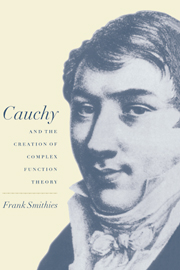Book contents
- Frontmatter
- Contents
- Introduction
- 1 The background to Cauchy's work on complex function theory
- 2 Cauchy's 1814 memoir on definite integrals
- 3 Miscellaneous contributions (1815–1825)
- 4 The 1825 memoir and associated articles
- 5 The calculus of residues
- 6 The Lagrange series and the Turin memoirs
- 7 Summary and conclusions
- References
- Notation index
- Author index
- Subject index
4 - The 1825 memoir and associated articles
Published online by Cambridge University Press: 10 October 2009
- Frontmatter
- Contents
- Introduction
- 1 The background to Cauchy's work on complex function theory
- 2 Cauchy's 1814 memoir on definite integrals
- 3 Miscellaneous contributions (1815–1825)
- 4 The 1825 memoir and associated articles
- 5 The calculus of residues
- 6 The Lagrange series and the Turin memoirs
- 7 Summary and conclusions
- References
- Notation index
- Author index
- Subject index
Summary
4.1. On 28 February 1825 Cauchy communicated to the Académie des Sciences a memoir entitled ‘Mémoire sur les intégrates définies prises entre des limites imaginaires’. He published an abstract of it in the Bulletin de Férussac [1825a] in April of the same year. The complete memoir was issued as a separate pamphlet in August [1825b]. It was republished by Darboux in the Bulletin des Sciences Mathématiques in 1874–5, and a German translation of it appeared in the series Ostwalds Klassiker der Exakten Wissenschaften in 1900, with notes and commentary by P. Stäckel.
We shall usually refer to [1825b] as the 1825 memoir; it constituted an important advance in Cauchy's development of complex function theory.
In the present chapter we shall also include some account of a paper by Cauchy, published in two parts, [1825c] and [1826f], in Gergonne's Annales de Mathématiques; it can most conveniently be regarded as a sequel to the 1825 memoir.
4.2. In his introduction to the 1825 memoir Cauchy recalls his use of singular integrals in the 1814 memoir and his results on principal values in [1822b], [1823a] and in the Analyse infinitésimale [1823b], remarking that these together had enabled him to establish numerous general results on the evaluation or transformation of definite integrals. He now proposes to apply the same principles to integrals between imaginary limits.
He recalls Laplace's use of such integrals, and mentions that Brisson had recently used them to obtain expansions of functions in exponential series.
- Type
- Chapter
- Information
- Cauchy and the Creation of Complex Function Theory , pp. 85 - 112Publisher: Cambridge University PressPrint publication year: 1997



